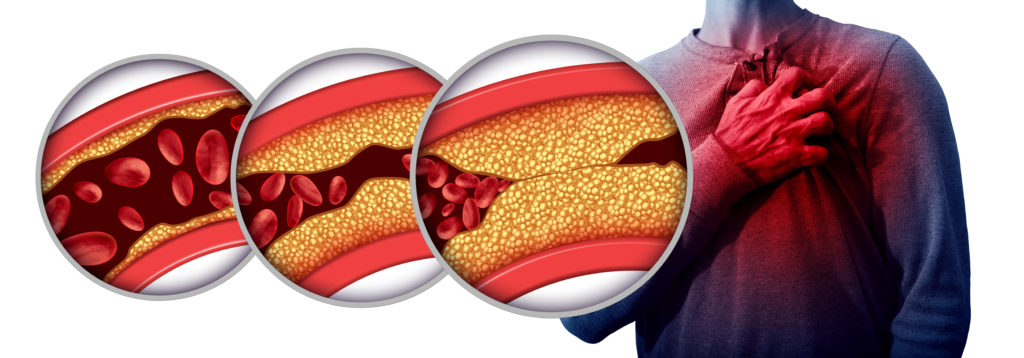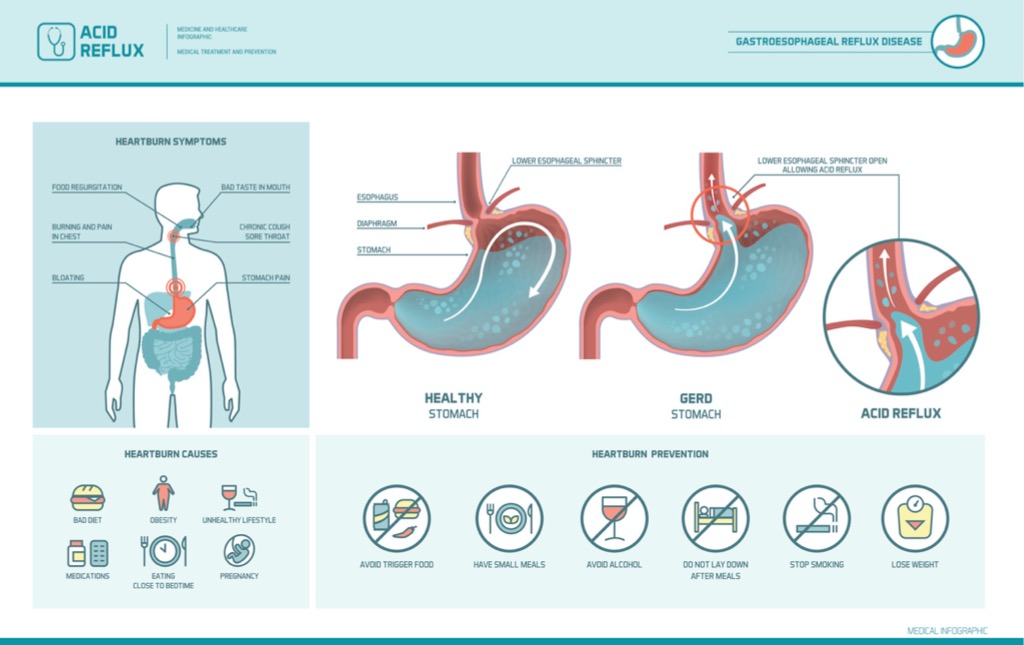Feeling chest pain can be a concerning symptom to experience. Is it simple heartburn, or should you seek medical attention for a heart attack? These two conditions may cause similar symptoms, they are very different in their origins and how they are managed.
In this article, you will learn what causes heart attacks and heartburn, what symptoms differentiate a heart attack from heartburn and ways to prevent future heart attacks or heartburn.
What is a Heart Attack?

A heart attack, also known as a myocardial infarction, occurs when the flow of oxygen-rich blood in one or more coronary arteries is reduced or blocked. Two major types of heart attack include ST-segment elevation myocardial infarctions (STEMI) and non-ST segment elevation myocardial infarctions (NSTEMI).
A STEMI, also known as a widowmaker heart attack, is the complete blockage (thrombosis) of the left anterior descending artery and is the most dangerous type of heart attack. An NSTEMI differs by having partially blocked blood flow through the arteries.1
What causes a heart attack?
Heart attacks usually start with the formation of arterial plaque – a buildup of cholesterol, cellular waste, fatty substances, and fibers along the inner arterial wall. Arterial plaque causes narrowing and stiffness to arteries and eventually the plaque ruptures due to stress.
Once a plaque ruptures, it can partially or completely block blood flow through an artery. Arterial blockages deprive part of the heart muscle of oxygen and nutrients. This causes the muscle to become damaged or die off (a process known as ischemia) and often leads to a heart attack.2
What are the symptoms of a heart attack?
Because heart attacks require quick intervention, knowing the symptoms of a heart attack can make a big impact on one’s outcome.3
Unlike heartburn, heart attack symptoms can begin hours or up to several weeks in advance. In some cases, heart attacks can occur suddenly with little warning.
Most commonly, heart attacks involve chest pain or discomfort that feels like squeezing, pressure, fullness, or pain. This sensation tends to last several minutes at a time, or may come and go, and is usually accompanied by other symptoms.
Other common heart attack symptoms are:
- Chest pain that travels from the left arm to the neck
- Arm or shoulder discomfort
- Weakness or lightheadedness
- Discomfort in the jaw, neck, or back
- Shortness of breath
- Abnormal heartbeat
- Sweating
- Nausea and/or vomiting
Women can experience chest pain or discomfort as a major heart attack symptom, but there are other symptoms they may experience:4
- Flu-like symptoms
- Extreme fatigue
- Shortness of breath
- Lightheadedness or fainting
- Upper back pressure
- Indigestion
- Dizziness
- Pressure or pain immediately below the ribs or in the upper abdomen
Heart Attack Complications
During a heart attack, time is of the essence. Most heart damage from a heart attack happens within the first two hours of the cardiac event. Reacting quickly to this medical emergency can reduce the risk of serious complications.
Complications of a heart attack may include heart failure, arrhythmias, cardiac shock, inflammation around the heart, and cardiac arrest.
If you or someone around you is experiencing the above symptoms, seek emergency medical attention immediately. Calling 911 is usually the fastest way to get treatment on the way to the hospital and upon hospital admission.
Heart Attack Prevention
In combination with regular screenings for heart disease, there are ways that you can lower your risk of a heart attack including:
- Eating a heart-healthy diet with foods rich in phytochemicals
- Eating foods rich in plant sterols and stanols
- Regularly exercising
- Maintaining a healthy weight
- Managing chronic diseases such as diabetes
- Optimizing blood pressure
- Managing blood lipids, like LDL
- Smoking cessation
What is heartburn?
Heartburn, also known as acid reflux or acid indigestion, is a burning sensation felt in the chest behind the breastbone caused by stomach acid regurgitation into the esophagus.
What causes heartburn?

Heartburn occurs due to the relaxation of the lower esophageal sphincter (LES) at the wrong time. The LES is located at the point where the esophagus meets the stomach. Its purpose is to protect the esophagus from the acidic contents of the stomach.
A combination of muscle function and neurohormones (hormones produced by nerve cells) control the opening and closing of the sphincter. A malfunction in either of these can result in improper relaxation of the LES or the inability of the LES to fully close.
When the LES is unable to close or relaxes earlier, this allows for the backflow of stomach acid into the esophagus, which then causes the common burning sensation of heartburn.5
Who is at risk for heartburn?
While acute heartburn can happen to anyone, there are conditions that can increase the likelihood of getting more frequent heartburn.6
Conditions that increase heartburn risk include:
- Pregnancy
- Smoking or inhaling secondhand smoke
- Being overweight or obese
- Hiatal hernias
- Slow gastric emptying
What are the symptoms of heartburn?
Symptoms of heartburn usually occur within the first 30 to 60 minutes after a meal but may start as late as four hours after eating. Once symptoms begin, they can last for up to two hours. 7
Common symptoms of heartburn include:
- A painful and burning sensation in the chest behind the breastbone
- Excessive burping
- A sour or bitter taste in the mouth
- Hoarse voice or a sore throat
- Coughing or choking while lying down
- Sleep disturbances
Complications of Heartburn
Heartburn that occurs frequently or consistently may be indicative of gastroesophageal reflux disease (GERD). If left unmanaged, GERD can result in complications such as Barrett esophagus, erosive esophagitis, esophageal strictures, upper gastrointestinal bleeding, and ulcers.8
Heartburn and chronic acid reflux can also increase the risk of cardiovascular disease. Acid reflux increases the number of pro-inflammatory cytokines within the esophageal mucosa. These cytokines may also circulate throughout the body and contribute to the development of atherosclerotic plaques, a known risk factor for conditions like coronary artery disease, aneurysms, and stroke.
Heartburn also triggers the vagus nerve, which impacts your parasympathetic nervous system. The parasympathetic controls automatic functions such as heart rate, digestion, and breathing.
Overstimulation of the vagus nerve can lead to abnormalities in its function and cause arrhythmia and atrial fibrillation, a drop in blood pressure and heart rate, and coronary artery spasms that can decrease or block blood flow to the heart. These complications can increase the risk of a heart attack. 9
Heartburn Prevention
Heartburn can be prevented by implementing a few simple lifestyle changes such as:
- Eating smaller meals
- Eating more fiber-rich foods
- Avoid foods that stimulate the LES, such as fried foods, acidic foods, or chocolate
- Maintaining a healthy weight
- Sitting upright for 15 to 30 minutes after meals
- Sleeping on your left side
- Wearing loose-fitting clothing to reduce stomach pressure
- Smoking cessation
More severe forms of heartburn may require medications to soothe some symptoms.
Summary: Heart Attack vs Heartburn
Heart attacks are medical emergencies that occur due to a blockage in the flow of oxygenated blood to the heart. Heartburn is an acute or chronic condition that is the result of the LES improperly relaxing and causing stomach acid to backflow into the esophagus.
Heart attack symptoms can begin anywhere from a few hours to a few weeks before it happens. Along with chest discomfort and pain, heart attack symptoms include shortness of breath, discomfort from the jaw down to the back, weakness and fatigue, flu-like symptoms, and abnormal heartbeat.
Heartburn symptoms usually occur 30 minutes to 2 hours after a meal and are localized to the upper gastrointestinal tract. You may experience a burning sensation in the chest, burping, a sour or bitter taste in the mouth, or coughing and choking while lying down.
Whether you are at risk of a heart attack or heartburn, you can support a healthy heart by making lifestyle changes and getting regular screenings from your doctor.
Actively Maintain Your Heart Health
Staying informed about your body and how it works is paramount to keeping yourself healthy. Getting guidance on how to most effectively optimize your heart health can have a bigger impact than you may think on your overall health.
My 6-week heart optimization group program can help you understand your heart conditions and learn how to prevent or manage them with diet and lifestyle. If you prefer a more personalized approach, I also offer 1 on 1 services to help reduce your risk of conditions like heart attacks or heart disease through science-based, personalized nutrition.
References
- Rehman I, Kerndt CC, Rehman A. Anatomy, Thorax, Heart Left Anterior Descending (LAD) Artery. [Updated 2021 Jul 26]. In: StatPearls [Internet]. Treasure Island (FL): StatPearls Publishing; 2022 Jan-. Available from: https://www.ncbi.nlm.nih.gov/books/NBK482375/
- Palasubramaniam J, Wang X, Peter K. Myocardial Infarction-From Atherosclerosis to Thrombosis. Arterioscler Thromb Vasc Biol. 2019;39(8):e176-e185. doi:10.1161/ATVBAHA.119.312578
- Fang J, Luncheon C, Ayala C, Odom E, Loustalot F. Awareness of Heart Attack Symptoms and Response Among Adults – United States, 2008, 2014, and 2017. MMWR Morb Mortal Wkly Rep. 2019;68(5):101-106. Published 2019 Feb 8. doi:10.15585/mmwr.mm6805a2
- Mehta LS, Beckie TM, DeVon HA, et al. Acute Myocardial Infarction in Women: A Scientific Statement From the American Heart Association. Circulation. 2016;133(9):916-947. doi:10.1161/CIR.0000000000000351
- Rosen RD, Winters R. Physiology, Lower Esophageal Sphincter. [Updated 2022 Apr 5]. In: StatPearls [Internet]. Treasure Island (FL): StatPearls Publishing; 2022 Jan-. Available from: https://www.ncbi.nlm.nih.gov/books/NBK557452/
- Argyrou A, Legaki E, Koutserimpas C, et al. Risk factors for gastroesophageal reflux disease and analysis of genetic contributors. World J Clin Cases. 2018;6(8):176-182. doi:10.12998/wjcc.v6.i8.176
- InformedHealth.org [Internet]. Cologne, Germany: Institute for Quality and Efficiency in Health Care (IQWiG); 2006-. Heartburn and GERD: Overview. 2012 Jul 19 [Updated 2018 Dec 13]. Available from: https://www.ncbi.nlm.nih.gov/books/NBK279254/
- Young A, Kumar MA, Thota PN. GERD: A practical approach. Cleve Clin J Med. 2020;87(4):223-230. doi:10.3949/ccjm.87a.19114
- Lei WY, Wang JH, Wen SH, et al. Risk of acute myocardial infarction in patients with gastroesophageal reflux disease: A nationwide population-based study. PLoS One. 2017;12(3):e0173899. Published 2017 Mar 20. doi:10.1371/journal.pone.0173899